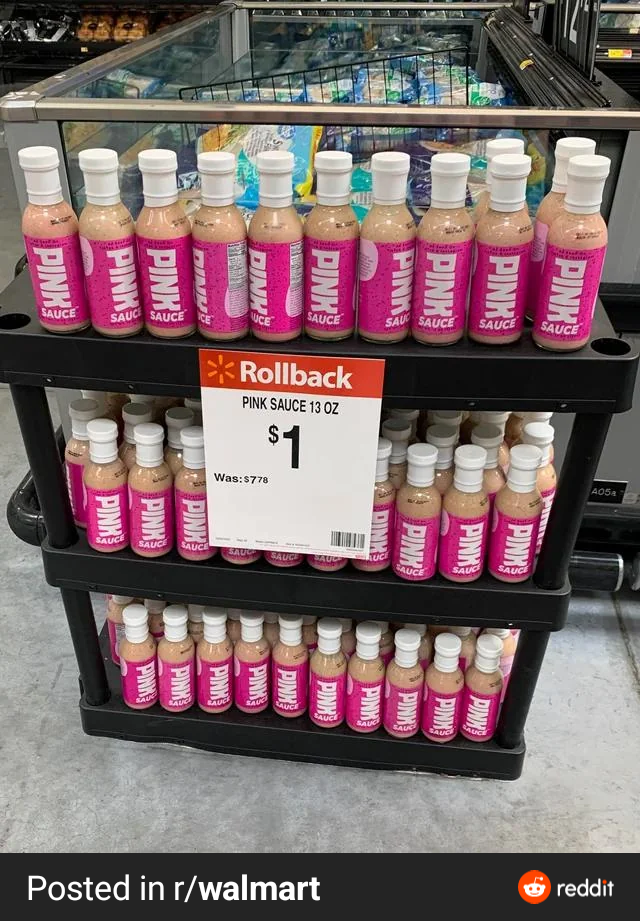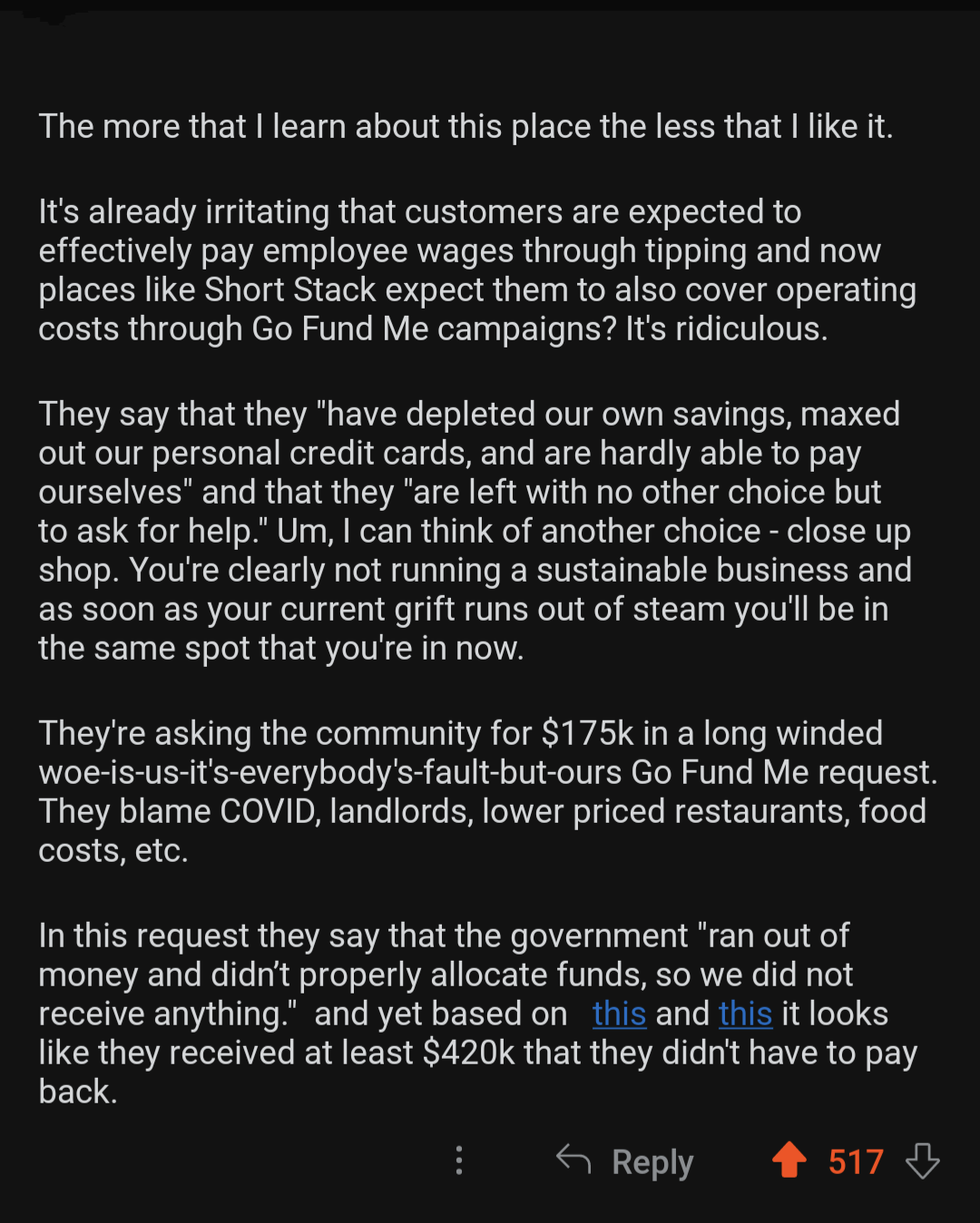GoFundMe...you know, the thing friends, family, and organizations occasionally use in times which it is reasonable to ask for a community's help to address a critical need such as a health emergency, displacement due to property loss or catastrophe, and other significant events that have great potential to be adversely life-altering. Though nowadays, the idea of critical need seems to be subject to individual interpretation, and when one browses the platform, requests can cover things that some may view as out of scope for the platform.
As a food blog with the intent to cover business and social topics in food, food service, and other items food-related, we are compelled to discuss a topic that's been a hot potato for a little over a year now; the Pink Sauce.
In these converging stream of thoughts, this post will spend some time on a well-archived use case of GoFundMe going controversial...particularly, the Pink Sauce GoFundMe drama. Additionally, we'll provide some commentary on more locally focused campaigns that have their respective communities talking, before concluding with the overall effect the rhetoric and discussion has on the greater food & restaurant industry.
With the framework in place, let's get started!
Oh, Pink Sauce...
In case other things have taken higher priority than keeping up with Pink Sauce news, we'll try to give you a brief summary of events:
- At some point in the summer of 2022, a TikToker going by chef.pii got some attention over a "Pink Sauce" which video shorts displayed generous amounts of the stuff being drizzled over foods such as chicken, fries, and other fried food. The content creator was consistently coy about how it was made, and that coyness eventually translated to the sale, packaging, and independent distribution of the sauce at an initial sale price of $20.
- As the independent distribution commenced, a series of follies were shared across social media; from inaccurate nutrition labeling (the misspelling of the word vinegar as "vinger" was a popular callout), to the rupturing and arrival of other damaged product upon delivery; potentially due to non-shelf-stable ingredients being used in the production of the sauce.
- In a now-infamous rant, chef.pii responded to criticism on social media, asking/ranting, "what do you mean FDA approved!? I don't sell medical products! The Pink Sauce is not a medical product!". The most popular reactions were that the "F" in FDA stands for "Food".
- Riding out the infamy snowball, a talk show titled, "The Karamo Show" hosted chef.pii along with TikToker alluredbeauty, who previously posted a critical series of video shorts covering tasting/reaction on the TikTok platform. A YouTube video of the chef.pii interacting with alluredbeauty on a talk show setting gave this drama some hot takes such as chef.pii's "You are not special" reaction, along with Karamo's line, "I think the learning is more on your part...and that's being real", addressing alluredbeauty's comment of, "I think there's learning on both parts". Following the publishing of the video, many were quick to point out the one-sidedness of the show and the host's tendency to gaslight alluredbeauty.
- In an attempt to roll back the initial show reaction, a follow-up video, subtitled "Update: Pitfalls of Social Media" brought the initial crew together with the host seemingly acknowledging & apologizing for his gaslighting. Equally important in this update, it is shared that the "Pink Sauce" product is being sold at Wal-Mart stores.
- At time of writing, Pink Sauce is being distributed by Dave's Gourmet. As previously noted, the sauce is seemingly available at Wal-Mart, and directly through the Dave's Gourmet website.
- In the latest developments, chef.pii (as Veronica Shaw) has posted a GoFundMe, with a goal of $100,000 as a result of being "financially sabotaged" by the deal, though as reported through various media outlets, Dave's Gourmet has released approximately $120,000 in payments to date and is satisfying the terms of their contract
...We Hardly Knew Ye
In light of the information mentioned in the summary above, it's worth noting that a major variable in business profitability are sales...in other words, sell more product, make more money. With this basis, it would seem that the main contributor would be the distribution channel (or channels), and with Wal-Mart being one of, if not the single largest brick-and-mortar retailers in the U.S., the main question would be, 'How's the Pink Sauce selling at Wal-Mart'?
If one ever ventures across the r/walmart subreddit, one will find an employee-focused forum occupied by both complete clowns and insightful retail employees posting memes, personal experiences as a retail employee for the corporation, and occasional hot takes on news-making headlines. It's in this subreddit that a major detail the Pink Sauce debacle can be found; there are a handful of posts themed around the Pink Sauce...specifically how it's been marked down in recent months due to sales against inventory.
As someone who may not (or may) have worked at the retailer at one point, Wal-Mart has a combination of pricing processes to manage inventory. One is Rollback/Clearance pricing, used basically to move inventory off the shelves, and the other is Customer Value Program (CVP) pricing; reserved primarily for expiring food items but can be used for other products, to sell inventory before it surpasses its sell-by date.
The r/walmart subreddit has posted instances where both processes have been used to sell Pink Sauce inventory. Though Wal-Mart has a huge retail footprint and a few posts from a few employees at a few stores may not be an indicator of a larger trend, given the drama and overall hot mess of the whole situation, it's definitely not out of the question that the Pink Sauce is simply not selling, therefore in chef.pii's case, there is simply no money to pay out for the product after margins and expenses.

Pink Sauce on a clearance shelf
(image from r/walmart, photo credit u/dedtalktoyourself)
GoFundMe...[sigh]
As a reflection of the original sentiment posted on the top of the article, it seems important to explore a potential interpretation of GoFundMe and its use in the crowdfunding space. Additionally, while some of the concepts and ideas could be seen as a projection of personal interpretation, the intent of the article is not to influence nor dissuade an individual or organization to interact with or donate to campaigns such as those featured... in other words, how one allocates their own money is their own business. That said, it's also important to outline trends and patterns in this area, particularly in regard to the scope and scale of such campaigns for individuals and organizations in which platforms with other crowdfunding objectives may be better suited.
As a baseline, I'll use the following assumptions to form an argument against the use of the GoFundMe platform in the for-profit organizational space:
- Based on generalized information on the GoFundMe.com site, the categories for crowdfunding are generalized as follows:
- Medical (cancer, surgery, IVF, medical insurance)
- Emergencies (natural disaster, fire, tragedy)
- Memorial (funeral, end of life care, scholarship)
- Education
- Non-Profit (501(c)(3) organizations)
- The two common links among the categories focus on a combination of indemnity for groups & individuals, and/or contribution toward social improvement
- Crowdfunding specific to the GoFundMe platform represents funds which, minus platform expenses, are funds distributed primarily without condition
- As a result of the nature of (2) and (3), crowdfunding outside the scope of the examples listed in (1) presents a lack of incentive to preserve an organization (or individual)
- Without incentive to preserve, the spirit of crowdfunding outside altruistic purpose nullifies the specific objectives of the GoFundMe platform
- The GoFundMe platform is not appropriate for profit-seeking individuals and organizations

hot take on reddit regarding short stack eatery
(photo credit r/madisonwi, username removed from image)
GoFundMe...scaled locally [more sigh]
In addition to the Pink Sauce GoFundMe from earlier this summer, two other campaigns for Business Entites in my on-again, off-again hometown got the community talking: one for a chocolate shop, CocoVaa located in Madison, WI with limited hours, asking for $500,000 to "build a world class chocolate factory"...and the other for a downtown Madison breakfast spot, Short Stack Eatery asking for $175,000 to, apparently, keep shop running (Note: this campaign was recently closed off from new donations).
In terms of community reaction, there's really nothing I could add to either of these campaigns that wasn't said on the r/madisonwi subreddit. For context, I'll add the posts/threads below:
How is Short Stack in Financial Trouble Again? (r/madisonwi)
Another Crazy GoFundMe!? (r/madisonwi)
Regardless of politics, social opinions, and all the other stuff that sometimes tends to cloud the fundamentals of running a business, a core question to ask within the scope of the argument initially made is, "What would keep these business owners from taking the money and running off with it"? While GoFundMe campaigns exist for for-profit organizations, the worthwhile ones, at least IMO, tend to be indemnity-related expenses such as replacing a stove or other piece of critical equipment damaged in a fire, or finding a temporary space to do business as a result of a natural disaster. It's at the very least an interesting trend of using an unconditional crowdfunding platform to gather money for a for-profit business. If over the past 1-2 months alone, 3 campaigns...1 with national attention and 2 with more of a local focus are active, is this indicative of a bigger trend? Are other service-oriented businesses in other areas of the country doing the same thing?
Final Thoughts
In fairness to my own interpretations of crowdfunding and the various platforms accessible to individuals and businesses, back in my early indie website days I set up a GoFundMe with a focus toward getting my own web projects up and running. In my own defense, GoFundMe was a newer platform, back then I had a fraction of the insight I have nowadays, it was only up for a handful of days, & it collected no money. Though the decision had absolutely no effect on anything, at least based on my vantage point, I feel marginally clown-like for thinking it was a potential resource.
Yet here we are...individuals who seemingly profited off a viral social media trend, and businesses responsible for not only their organizations but also the people they employ and the vendors, partners, and consumers they serve and interact with, are spinning stories around the "need" for unconditional business & personal funding well outside the scope of indemnity or social benefit. At the end of the day, it's important to reiterate that people are free to allocate money as they see fit, yet at the same time an uneasiness remains around the idea of paying/contributing to an individual or organization...especially a for-profit organization or an individual without a legitimate indemnity claim.
Even with all that unease, though, there is at least some comfort that our society is capable of catching things like this and calling it out accordingly.
Editor Note:
Links to the GoFundMe campaigns referenced in this article were intentionally omitted. Though central to the overall theme of the article, we came to the conclusion that the sharing of such a link would indicate an endorsement of these campaigns. That is not the case. Additionally, as GoFundMe campaigns are not permanent we wanted to conserve future edits by not including the links.
Links to the respective campaigns were easily accessible via most search engines if there's an interest in contributing to any of them.
